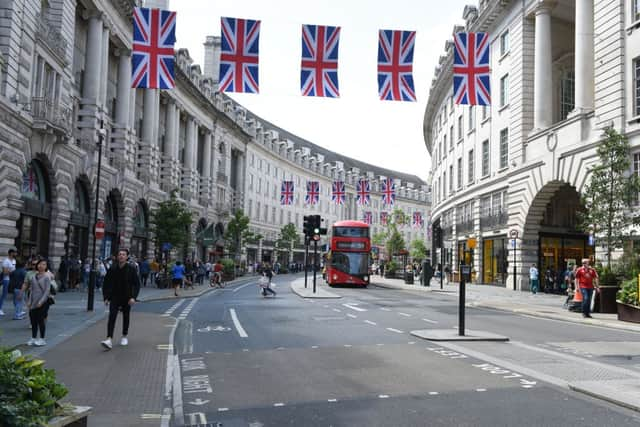UK economy shrinks by 0.1% in second quarter as experts predict a recession later this year
and live on Freeview channel 276
The UK’s economy shrank over the last three months as spending on test and trace and the Covid vaccine programme subsided, latest figures show.
Gross domestic product (GDP) fell by 0.1% between April and June, according to the Office for National Statistics (ONS). It follows a positive first quarter which saw GDP rise by 0.8%.
Advertisement
Hide AdAdvertisement
Hide Ad

The figures come after the Bank of England predicted that the UK will fall into a recession by the autumn, with the economy expected to shrink in the final quarter of this year and then every quarter in 2023.
The latest data may not be the start of a recession - which is defined as two quarters of GDP decline - but experts are predicting the UK will slip into a recession later this year.
Yael Selfin, chief economist at KPMG UK, said: “While we see increasing signs of underlying weakness in the economy, we expect a more severe downturn to take place only from towards the end of this year.”
The downtown is expected to start in the next quarter after Ofgem hikes the price cap on energy bills in October.
Advertisement
Hide AdAdvertisement
Hide AdLatest predictions suggest the cap will rise by 84% to £3,634 in two months’ time and could top a staggering £5,000 next year.
Experts have warned that Ofgem could be forced to set the cap at £5,038 per year for the average household in the three months beginning next April, which is more than £200 higher than previous forecasts and heaps extra pressure on households across Britain. Auxilione, an energy consultancy, also predicted that bills would reach £4,467 in January.
The price cap rise is also adding to inflation fears, with consumer price index inflation expected to top more than 13% in October, according to the Bank of England.
Ending test and trace dealt a blow to the economy
The most recent drop in the UK economy came as GDP shrank by 0.6% in June, and growth estimates for May were revised down from 0.5% to 0.4%.
Advertisement
Hide AdAdvertisement
Hide AdThe ONS said that the phasing out of spending on fighting Covid was partly to blame for the contraction over the quarter.
Darren Morgan, director of economic statistics, said: “Health was the biggest reason the economy contracted as both the test and trace and vaccine programmes were wound down, while many retailers also had a tough quarter.
“These were partially offset by growth in hotels, bars, hairdressers and outdoor events across the quarter, partly as a result of people celebrating the Platinum Jubilee.”
On Thursday (11 August), Chancellor Nadhim Zahawi and Prime Minister Boris Johnson refused to take any fiscal action after meeting with bosses of the UK’s biggest energy companies.
Advertisement
Hide AdAdvertisement
Hide AdFollowing the meeting they re-iterated the support on bills, which was announced several months ago when the October price cap was predicted to reach just £2,800 in October.
However, latest predictions show the cap will be nearly £900 more than previously predicted and is likely to pass £5,000 in April.
Chancellor Zahawi said: “Our economy showed incredible resilience following the pandemic and I am confident we can pull through these global challenges again.
“I know that times are tough and people will be concerned about rising prices and slowing growth, and that’s why I’m determined to work with the Bank of England to get inflation under control and grow the economy.
Advertisement
Hide AdAdvertisement
Hide Ad“The government is providing billions of pounds of help for households with rising costs, including £1,200 for eight million of the most vulnerable households.”
Any new government support to help with rising energy costs will have to be decided by the new Prime Minister, who will not be in place until early September.
Comment Guidelines
National World encourages reader discussion on our stories. User feedback, insights and back-and-forth exchanges add a rich layer of context to reporting. Please review our Community Guidelines before commenting.
